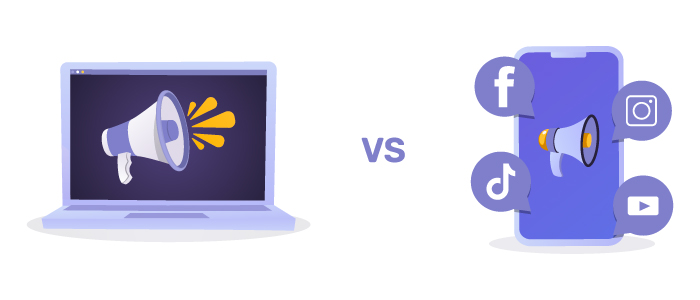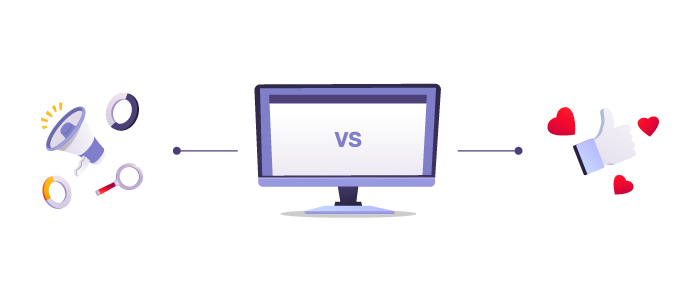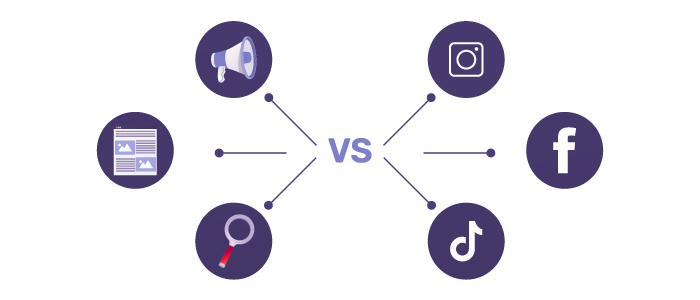Your Guide on Digital Marketing vs. Social Media Marketing
Did you know that 95% of internet users browse on a mobile device most of the time or that mobile devices account for approximately 57% of people’s online time?
Indeed, when businesses think of going online, they think of social media marketing without knowing their business goals, having a strategy, or even knowing their audience to see if the shoe fits. Yet, more than ever, it is crucial for businesses to understand the difference between digital marketing vs. social media marketing, as each has different scopes and, thus, different channels.
But that’s why we are here today: to guide you in understanding the fundamental differences between digital marketing and social media marketing.
So, let’s jump in!
Digital Marketing vs. Social Media Marketing at a Glance

Thus, here’s a breakdown of digital marketing vs social media marketing to give you a clearer picture.
Scope:
- Digital Marketing encompasses all online marketing efforts like a giant digital umbrella. Therefore, it includes website design, search engine optimization (SEO), pay-per-click (PPC) ads, email marketing, content marketing, and social media marketing.
- Conversely, Social Media Marketing focuses on leveraging social media platforms like Facebook, X (Twitter), or others to connect with your audience, build brand awareness, and drive engagement. It’s one tool within the digital marketing toolbox.
Goals:
- Digital Marketing sustains broader goals like increasing website traffic, generating leads, boosting sales, and improving brand reputation.
- Social Media Marketing has more specific goals, such as growing your social media following, increasing brand awareness, driving website traffic, and fostering customer engagement (likes, comments, shares).
Channels:
- Digital Marketing utilizes online channels like websites, search engines, and email.
- Social Media Marketing uses specific social media platforms, such as Facebook, Instagram, X (Twitter), etc., and the platform choice depends on your target audience and goals.
Metrics:
- Digital Marketing tracks a broader range of metrics, such as website traffic, conversion rates, lead generation, brand mentions, and SEO ranking.
- Social Media Marketing monitors metrics like follower growth, engagement rate (likes, comments, shares), reach (how many people see your content), click-through rates (clicks on links in your posts), and brand sentiment (positive or negative mentions).
Digital marketing could be considered your overall online strategy, which defines your target audience, goals, and the channels you’ll use to reach them. On the other hand, social media marketing is a specific tactic within that strategy that uses social media platforms to achieve specific marketing objectives that contribute to your overall digital marketing goals.
Now, let’s learn more about each segment and see how it fits within your business strategy. However, please note that it’s important to distinguish between types of marketing, like digital and social media, and between marketing vs. advertising, as each plays a unique role in brand strategy.
What is Digital Marketing?

Digital marketing is a broader term for implementing a series of digital channels to increase brand awareness and customer trust, create value, and drive revenues while increasing your ROI. As with any online endeavor, you’ll need a strategy, such as A/B testing, digital marketing analytics, and further optimizing to reach your target audience.
Furthermore, when discussing digital marketing for small businesses, things take a different turn, as their scope and missions are different compared to those of a business that is already on the market and aims to upskill its online presence.
Here are a few examples of digital marketing strategies:
- Search engine optimization (SEO);
- Pay-per-click (PPC) ads;
- Email marketing;
- Content marketing;
- Social media marketing;
- Web design and development.
That’s right, social media marketing falls under the digital marketing umbrella!
What is Social Media Marketing?

Social media marketing is a single-focus strategy distributed across various channels such as Facebook, Instagram, X (Twitter), LinkedIn, YouTube, Pinterest, TikTok, and others.
So, choosing which social media platform to use depends on what channel best expresses your brand while offering increased visibility and allowing customers to engage with your brand.
Social media marketing strategy includes:
- Clients and potential customer engagement;
- Analytics;
- Influencers collabs;
- Giveaways and contests;
- Attention-grabbing content;
- Organic and paid marketing ads.
Now, let’s look at the main pillars of digital marketing vs. social media marketing.
Digital Marketing vs Social Media Marketing: Key Pillars

Key Pillars of Digital Marketing
1. Data
When discussing data, you must know that it’s branching out into three types:
- Demographics, which means who’s your audience;
- Behavioral, meaning the data related to your audience activity;
- Contextual, which depicts the real-time events.
2. Technology
Technology, combined with data, makes the digital marketing world go round. Moreover, three types of techs also bring good results:
- Third-party tools;
- On-premises or in-house technologies;
- Software to collect customer activity online.
3. Users
You cannot have a digital product or SaaS business without having users use it; better said, without being a need for what you’re advertising.
Key Pillars of Social Media Marketing
1. Strategy and Planning
Creating a robust strategy is essential, as you can set up the type of content you wish to post, on what platform, and to whom. Once settled, you can start planning or scheduling your posts in advance, ensuring consistency.
2. Social Media Reporting
As you start posting, you must analyze your metrics and interpret the results. You can track the performance of your content daily, weekly, monthly, and quarterly.
3. Advertising
Paid advertising strategies can help your business reach a broader audience on social media platforms.
Digital Marketing vs Social Media Marketing: Metrics
Digital Marketing Metrics
Digital marketing encompasses a broader range of strategies, so the metrics used reflect its diverse channels:
- Website Traffic: Unique visitors, page views, bounce rate;
- Conversion Rate: Percentage of users taking desired actions (e.g., filling forms, making purchases);
- Cost Per Click (CPC): The price paid for clicks in PPC campaigns;
- Return on Investment (ROI): Overall profitability of campaigns;
- Click-Through Rate (CTR): Percentage of ad viewers clicking on the ad;
- Email Engagement: Open rates, click-through rates, and unsubscribe rates;
- SEO Performance: Organic traffic, keyword rankings, and backlinks.
Social Media Marketing Metrics
Social media marketing focuses specifically on platforms like Facebook, Instagram, and LinkedIn, with metrics tailored to engagement and visibility:
- Engagement Rate: Likes, comments, shares, and reactions;
- Reach: The total number of unique users who saw the post;
- Impressions: Total times a post was displayed, including repeats;
- Follower Growth: Increase or decrease in follower count over time;
- Referral Traffic: Visitors are driven to a website from social media;
- Video Metrics: Views, watch time, and video completion rates;
- Social ROI: Revenue or leads directly attributable to social efforts.
Digital Marketing vs Social Media Marketing: Differences

Let’s discover the differences between these digital extensions, so you know what to choose best.
1. The Online Channels
Digital marketing focuses on multiple channels, often called a multi-channel strategy. The channels could include SEO, PPC, email marketing, and others.
Therefore, from one content idea, like a blog article, you could spread it across multiple channels, such as videos on TikTok and Instagram, a newsletter on email marketing, etc.
As a result, digital marketing enables you to expand your reach through multiple online channels.
However, social media focuses only on one digital channel, such as social media, including its platforms. Moreover, since 74% of consumers use social media platforms to determine whether to buy, focusing on posting original, authentic, and helpful content that speaks to your audience could be the way to ensure conversions and sales.
2. Audience Targeting
While digital and social media marketing offer targeted ways of messaging your audiences, there could be some differences. Start by looking into your audience: where they hang out, what their interests, demographics, and behavior are, and any details that could give you a clearer picture of your target audience.
For example, through social media marketing, you can create engaging yet business-like social media posts, share attention-grabbing content, and hold contests and giveaways, encouraging customers to follow and engage with your brand.
You can also create retargeting ads that eventually appear in the newsfeeds of engaged users with your brand and on social media channels.
For digital marketing, you can start by using (hyper) personalized marketing messages on social media and pushing your content into other online channels, like your website, email marketing, and others.
You can also start with PPC ads based on targeted keywords that users search for, promote your new products through email marketing, or create organic posts based on their pain points.
3. Audience Engagement
To engage with your audience on social media, you can respond to comments and messages from your business account, answer their questions, ask for feedback, hold a giveaway, and more.
There are also strategies for increasing your digital marketing engagements, such as sending an abandonment cart (personalized) email, email marketing automation to increase lead engagement, or creating content that directly speaks to your customers.
Digital Marketing vs Social Media Marketing: The Benefits

5 Benefits of Digital Marketing
- Global Reach: Digital marketing helps businesses reach a broader online audience globally.
- Cost Efficiency: Most strategies have a low startup cost.
- Measurable Results: In digital marketing, you can track almost every touchpoint your users have with your brand, regardless of the type.
- Effective Targeting: You can discover your target audience’s interests and points and know how to address them better on their journey.
- Greater ROI: Businesses could gain more value through digital marketing, and thus, it is easier to measure and increase your ROI, as you can quickly pinpoint it to sales and specific digital marketing campaigns.
5 Benefits of Social Media Marketing
- Improve Your Brand: Social media can help your business gain visibility, and when done correctly, it could positively impact your target audience.
- Engage the Audience: Social media gives you direct feedback on your online presence. You can engage, respond, and share user-generated content.
- Promote Customer Service: You can be a step closer to your target audience through social media, even though you have listed your emails, phone numbers, and other information.
- Impact Sales and Conversion Rates: As more and more users are spending more time on social media and researching brands, you could say that this channel is becoming the top-of-funnel.
- Become a Thought Leader: By sharing educational content, empowering others, and not bragging about your brand, you can position yourself as a thought leader and expert within your niche.
But How Do They Work Together?
As mentioned, digital marketing and social media work well together, especially when social media is under the digital marketing umbrella. Other than this, there’s a sync or, better said, a complementary relationship between these two since one enhances the other. Thus, we recommend integrating them both, if your niche allows it, and not choosing one.
By using both, you can integrate social media within your overall strategy to drive traffic from social media toward your website or specific landing pages. Then, you can benefit from cross-promotion, meaning that social media will amplify your digital marketing efforts and offer you a practical way to interact with your audience.
Another aspect is content distribution, which this power-up will enhance. By repurposing your marketing content into bite-sized pieces for social media, you will have more than enough content to share promptly.
Pro tip: check out top tips and tricks in digital marketing for small businesses to get your business up and running.
Bonus: Digital Marketing vs Social Media Marketing Tools

Digital Marketing Tools
Keyword Research Tools:
Email Marketing Platforms:
SEO Tools:
- SEMrush;
- Google Search Console;
- Ahrefs;
PPC Advertising Platforms:
Social Media Marketing Tools
Management Platforms:
Social Listening Tools:
Influencer Marketing Platforms:
Analytics Tools:
Digital Marketing vs Social Media Marketing: Which is Better?

We can’t say which is better, as they have different goals and scopes. It is wise to start by determining your end goals, budget, and available resources.
For example, social media is best when you focus on a single channel, increasing your brand awareness while engaging and communicating with your audience.
Choose digital marketing to maximize your online presence through multiple channels, such as search engines, social media, emails, and more. Thus, you can boost your ROI.
Whatever you choose, start small, do an A/B test, see how the flow goes, and then optimize further for better results.